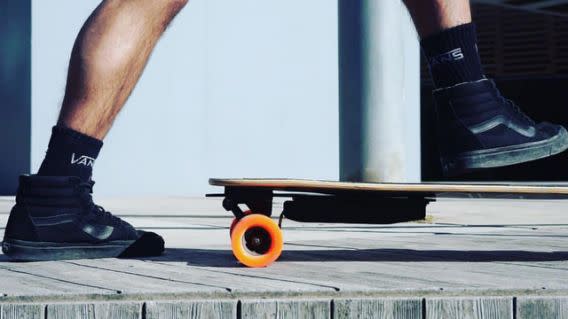How Amazon is helping 300 startups get to the next level

Kickstarter is a great way to crowdfund a startup. But what happens once the campaign is over? Enter Amazon (AMZN), which launched a new partnership that hopes to keep the momentum going even after a Kickstarter project meets, or exceeds, its funding goal.
Ahead of the company’s blowout quarter on Thursday, Amazon announced a collaboration with Kickstarter that now features more than 300 products hatched on the crowdfunding platform.
The new collaboration with Kickstarter is part of LaunchPad, a one-year-old program that showcases products from startups. Now, products launched on Kickstarter will be available for purchase on Amazon.com. In addition to being available on a standalone landing page, the 300 products are listed on Amazon.com in their respective categories (e.g. electronics, wireless devices). Those products range from Prynt — a case that turns your phone into a Polaroid camera — to Zivix, a portable smart guitar.
The companies don’t need to pay Amazon an extra fee; the financial relationship is just like that between Amazon and any vendor on its site. Amazon offers two selling plans to its vendors — the professional plan costs $39.99 per month plus per-item selling fees (which vary by category) and the individual plan costs sellers $0.99 per item sold plus additional fees. The partnership is intended to be a mutually beneficial, co-marketing experience, says Amazon PR manager Lori Richter.
“Kickstarter takes companies up to a certain point,” she told Yahoo Finance. “And Amazon can help them get the product on a retail platform and really execute in a bigger way.”
Kickstarter’s communications manager, Justin Kazmark, says the partnership helps startups keep up the success they’ve accrued on Kickstarter.
“Now they have a second home by landing on Amazon,” he says. “They are in a place with a huge global reach and the project can continue to be discovered.”
One of the concerns with Kickstarter is that you’re betting on a product that hasn’t been created yet. Even if you’re promised a pair of shoes or a keyboard waffle iron by a certain date, a manufacturing or shipping issue may delay when you actually receive the product from a company you’ve invested in.
“When you’re pledging to something on Kickstarter, it really is just an idea. You’re taking a chance on somebody. And delays do occur but there is more success than anticipated,” Kazmark says.
Amazon requires that the 300 Kickstarter companies ensure that their products will be ready to ship before their product is made available on their Launchpad program, according to Richter. She says Amazon consults with 100 venture capital firms and startup accelerators to get a sense of “the coolest new startups” it would like to feature on its site. It’s a huge win for the startups because without paying additional cost, they get to take advantage of Amazon’s fulfillment center. All the entrepreneur needs to do is handle the manufacturing; Amazon takes over to handle the customer service, shipping and delivery.
This initiative is part of Amazon’s larger push to let consumers know it offers a bevy of products that aren’t ones you’d necessarily search for. The company, often referred to as “the everything store” is frequently used by consumers who know exactly what they are looking for, whether it be a TV or baby food.
Mike Burtov, the founder of GeoOrbital, a company that makes an electric bike wheel, raised $1.26 million from 1,623 people during its 45-day campaign on Kickstarter. The company met its goal of $75,000 within 58 minutes of being online. This puts GeoOrbital in the top .05% of all crowdfunding platforms in terms of capital raised.
He says 70% of the purchases were being shared organically by friends of the company, but he needs to find a retail partner in order to get to the next level — sales.
“The virality of Kickstarter is super important in order to get exposure but afterward we thought, ‘What happens next?’” he says. “Amazon could be that next chapter. It’s an excellent thing.”
Melody Hahm is a reporter at Yahoo Finance. Read more from her:
Here are the Prime Day deals Amazon didn’t want you to see
Malcolm Gladwell sees one good thing about a Trump presidency
Gillette should be nervous about Unilever’s billion-dollar bet on Dollar Shave Club
